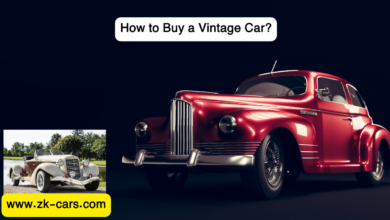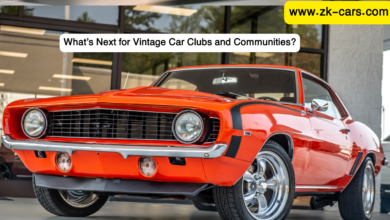Vintage Car Replicas A Growing Trend

In recent years, the automotive industry has seen a significant surge in the popularity of vintage car replicas. These meticulously crafted reproductions offer enthusiasts a chance to own a piece of automotive history without the hefty price tag or maintenance challenges of original models.
In this article, we’ll explore the growing trend of vintage car replicas, examining their appeal, the craftsmanship involved, and the market dynamics that are shaping this fascinating niche.
1. The Allure of Vintage Cars
A. Nostalgia and Heritage
For many car enthusiasts, vintage cars represent a time when automobiles were designed with artistry and individuality. The appeal of vintage vehicles often lies in their nostalgic value:
- Cultural Significance: Classic cars embody the spirit of their era, often reflecting the social and technological advancements of their time.
- Personal Stories: Many people have fond memories associated with specific vintage models, making replicas a way to reconnect with those memories.
B. Aesthetic Appeal
The design of vintage cars is often timeless, characterized by:
- Distinctive Styling: Many classic cars feature unique curves and details that are no longer found in modern vehicles.
- Color Schemes: Vintage cars often showcase vibrant colors and finishes that are rare today, attracting those who appreciate unique aesthetics.
2. Understanding Vintage Car Replicas
A. Definition and Scope
Vintage car replicas are reproductions of classic models, often built using modern techniques and materials. They come in several forms:
- Exact Reproductions: These are made to closely resemble the original model, using similar materials and specifications.
- Restorations: Some replicas are built on original chassis or components but updated with modern technology for better performance and safety.
- Custom Builds: Enthusiasts may also opt for custom replicas, which blend elements from multiple classic designs into a unique vehicle.
B. Why Replicas?
Replicas offer several advantages over original vintage cars:
- Affordability: While original vintage cars can command exorbitant prices at auctions, replicas provide a more accessible option.
- Reliability: Many replicas utilize modern engines and components, resulting in improved reliability and performance.
- Ease of Maintenance: With updated technology, maintaining a replica can be simpler and less costly than restoring an original vintage car.
3. The Craftsmanship Behind Replicas
A. Skilled Artisans
Creating vintage car replicas requires skilled artisans and craftsmen. The process involves several key steps:
- Design and Engineering: Replicating a vintage car often starts with detailed design work, including CAD (computer-aided design) models.
- Sourcing Materials: High-quality materials must be sourced to maintain the aesthetic integrity of the original model.
- Building and Assembly: Skilled craftsmen assemble the car, ensuring that it mirrors the original in both appearance and functionality.
B. Modern Technology Meets Tradition
Many replica manufacturers employ modern technology to enhance the building process:
- 3D Printing: This technology allows for the creation of intricate components that are difficult to manufacture using traditional methods.
- Advanced Manufacturing Techniques: Techniques such as CNC machining and laser cutting help achieve precision in parts that resemble the original designs.
4. The Market Dynamics of Vintage Car Replicas
A. Growing Demand
The market for vintage car replicas is expanding, driven by several factors:
- Increased Interest in Classic Cars: As more people become interested in vintage cars, replicas offer a viable entry point.
- Social Media Influence: Platforms like Instagram and YouTube have created a vibrant community of car enthusiasts who share their passion for vintage models, inspiring others to join in.
- Events and Shows: Car shows and events that feature replicas have grown in popularity, providing platforms for enthusiasts to showcase their vehicles.
B. Key Players in the Industry
Several companies have made a name for themselves in the vintage car replica market:
- Factory Five Racing: Specializes in building replicas of iconic sports cars, such as the Shelby Cobra.
- Jaguar Land Rover Classic: Offers a range of restored and replica vehicles from its classic line-up, allowing buyers to own modern recreations of historical models.
- AC Cars: Known for producing the AC Cobra, a legendary sports car with a rich history.
5. The Legal Landscape
A. Regulations and Compliance
Building and selling vintage car replicas is not without its challenges. Various regulations can impact this market:
- Intellectual Property: Manufacturers must navigate copyright and trademark laws when producing replicas of specific models.
- Safety Standards: Replicas must often comply with modern safety standards, which can influence their design and construction.
B. Insurance and Valuation
Valuing vintage car replicas can be complex, with factors such as:
- Originality vs. Customization: Fully original replicas may be valued higher than those that incorporate modern modifications.
- Market Trends: The popularity of certain models can fluctuate, impacting resale values.
6. Conclusion
The trend of vintage car replicas is a fascinating intersection of nostalgia, craftsmanship, and modern technology. As enthusiasts seek to connect with the past, replicas provide an accessible and reliable way to enjoy classic designs without the challenges associated with original vintage cars. With a growing market and increasing interest, the future of vintage car replicas looks bright, promising a vibrant community for both collectors and casual enthusiasts alike.
Common Questions
1. What are vintage car replicas?
Vintage car replicas are reproductions of classic models, designed to resemble the original cars while often incorporating modern technology for improved performance and reliability.
2. Why are vintage car replicas becoming more popular?
The growing interest in classic cars, combined with social media exposure and accessible price points, has contributed to the increasing popularity of vintage car replicas.
3. What advantages do replicas have over original vintage cars?
Replicas generally offer lower prices, improved reliability, and easier maintenance compared to original vintage cars.
4. Who are the major manufacturers of vintage car replicas?
Key players include Factory Five Racing, Jaguar Land Rover Classic, and AC Cars, among others.
5. What should I consider when purchasing a vintage car replica?
Consider factors such as craftsmanship, materials used, warranty options, and how closely the replica resembles the original model.
In summary, vintage car replicas represent a growing trend that appeals to both the nostalgic and the practical car buyer. As the market continues to evolve, these replicas promise to keep the spirit of classic automobiles alive for generations to come.



